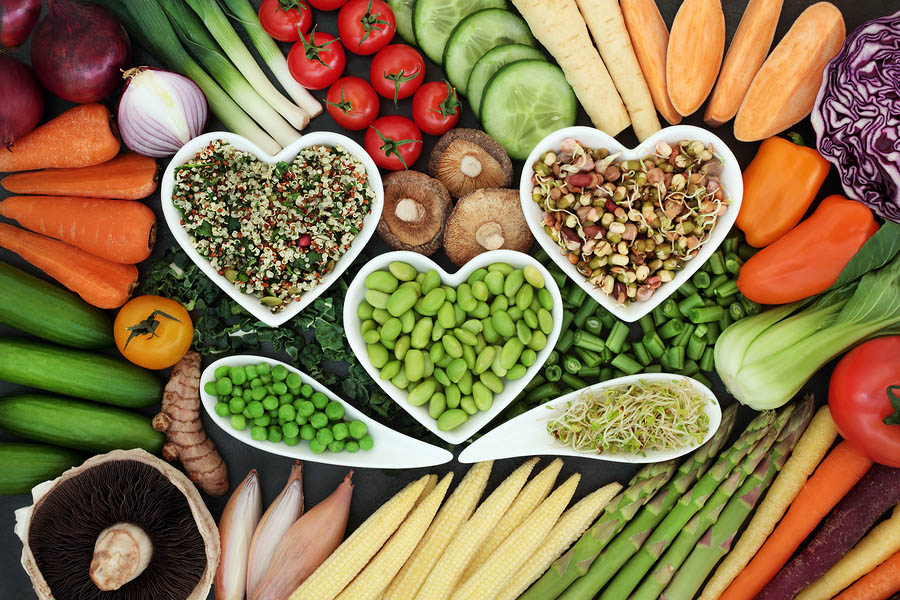Healthy and Happy Heart Diets: The Heart Diet That’s Right for You

Healthy and Happy Heart Diet
Heart disease is the leading cause of death in America, accounting for 610,000 deaths annually. The best way to protect yourself is with a heart-healthy diet. The leading risk factors for heart disease include high blood pressure, high cholesterol, diabetes, and excess body weight. And all of those factors can be controlled with your diet. In other words, a heart-healthy diet rewards you with years of life enjoyed in better health.
Get Heart-Healthy Nutrients
Fresh fruits and vegetables are the cornerstone of any heart-healthy diet. Fresh greens are rich in phytonutrients called flavonoids, which have been proven to reduce your risk of heart disease. Flavonoids tend to be concentrated in the skins of fruits and vegetables, so don’t peel them when possible. And because flavonoids can be lost during lengthy storage and cooking, you’ll want to make sure you’re eating them as fresh as possible.
Two more things to consider adding to your diet are soluble fiber and fatty fish. Foods that are high in soluble fiber can soak up cholesterol during digestion, preventing it from being absorbed by the body. And fish are rich in omega-3 fatty acids, which have been shown to reduce triglycerides and the buildup of arterial plaque.
Skip the Salt
Sodium contributes to hypertension, which contributes to heart disease. The Department of Health and Human Services recommends that adults consume less than 2,300mg of sodium per day. For anyone over the age of 51, people with diabetes, people with hypertension, and African Americans, recommended daily consumption is less than 1,500mg daily. Condiments and processed foods are where most people get their sodium, so those things are best replaced with fresh foods, herbs, and spices.
Avoid Sugar & Trans Fats
Avoid trans fats and hydrogenated oils as though they had a skull and crossbones on their packaging. Trans fats are unsafe for your heart in any quantity, which is why they’re set to be banned nationally by the FDA beginning in June 2018.
Sugar is another thing to be avoided with fervor. The connection between sugar and the heart isn’t fully understood, but it’s clear that added sugars in the diet lead to weight gain, diabetes, higher blood pressure, inflammation, and other factors that directly contribute to heart disease. Studies have found that people who get one-fifth of their calories from added sugar are 38% more likely to die from heart disease relative to people who consume half as much.
Consider Paleo
The paleo diet is an attempt to recreate the diet of our ancestors. Before the invention of agriculture, most humans survived on a varied diet of meats, nuts, fruits, and vegetables. Consequently, the paleo diet avoids refined sugars, grains, and processed foods that our distant ancestors didn’t eat. But is the paleo diet heart-healthy? For most people, the answer is yes.
The paleo diet corners you into eating high-fiber foods while avoiding sodium-rich processed foods. Those two factors alone can improve your heart’s health. However, it does place you at risk for deficiencies in vitamin D and calcium, which may need to be taken as supplements.
What About Saturated Fats?
The paleo diet does have one controversial aspect—it emphasizes the consumption of saturated fats. Whether or not saturated fats are healthy is a hotly debated issue in dietary science. Over the past decade, a growing body of research has found that saturated fats aren’t associated with heart disease, all-cause mortality, stroke, or type 2 diabetes.
The science isn’t settled, but one thing we know for certain is that most people will be worse off replacing saturated fats with simple carbs or refined sugars. If you do decide to avoid saturated fats, they need to be replaced with protein, unsaturated, or polyunsaturated fats. Once again, you’re looking at a diet resembling the paleo diet, with avocados, nuts, and non-processed meats.
Forming Healthy Habits
The diet plan for someone with coronary heart disease is the same as someone looking to avoid heart disease. The primary difference is if you’re not currently suffering from heart disease, it’s okay to take an indulgence from time to time. A bag of potato chips isn’t going to destroy your diet. It’s when those potato chips become a regular habit that they become dangerous.
If you’re already suffering from heart disease, you’ll want to stick to your diet. A heart-healthy diet can add years to your life, but consistency is key. You don’t want to dilly-dally when it comes to improving the health of an unwell heart.
Finally, even though most doctors aren’t experts in nutritional science, you should always consult your doctor before making any significant changes to your diet. Not every person has the same dietary needs, and a doctor can help ensure your dietary changes are all for the better.
Subscribe
Date: 2018-02-01


